
We speak with the Pulitzer Prize-winning journalist Maria Hinojosa after she got extraordinary access to an ICE detention center in Colorado, where she interviewed the immigrant rights activist Jeanette Vizguerra. The undocumented mother of four was arrested by federal agents in Denver in March after she successfully fought multiple deportation efforts since 2009, including when she took sanctuary in a Denver church with her children in 2017. She received a stay of removal but returned to sanctuary in 2019 when it expired, then received additional stays under the Biden administration that also expired. She now finds herself in the sights of the Trump administration as it seeks to fulfill its goal of mass deportations of immigrants. “I am a political prisoner,” Vizguerra told Hinojosa. She “believes that she is not being held in immigrant detention because of her immigration status, but rather she is being held because of her words and because of her activism,” says Hinojosa.
Transcript
AMY GOODMAN: We begin today’s show looking at the case of Jeanette Vizguerra, a well-known immigrant rights activist, mother of four, detained in Denver in March. She’s being jailed at the Aurora ICE Processing Center, operated by the private prison company GEO Group, in Colorado.
In 2009, Jeanette Vizguerra successfully fought deportation following a routine traffic stop. Then, in 2017, during the first Trump administration, she was targeted for deportation and took sanctuary in the Unitarian church in Denver, living there with three of her young children. She received a stay of removal, but then, upon its expiration in 2019, returned to sanctuary. She received additional deportation stays during the Biden administration, but those eventually expired.
Her lawyers allege that Jeanette was detained in March in retaliation for speech that’s protected under the First Amendment. Jeanette Vizguerra is a longtime activist who worked as an SEIU labor organizer, volunteered with the Colorado Immigrant Rights Coalition and the American Friends Service Committee, AFSC, and founded the activist organizations Dreamer’s Mothers in Action-Colorado, Abolish ICE Denver and Sanctuary for All.
In 2017, during the first Trump administration, I visited Jeanette Vizguerra at the First Unitarian Society Church in Denver, where she sought sanctuary, and talked to her.
AMY GOODMAN: Are you prepared for ICE to come in at any time?
JEANETTE VIZGUERRA: [translated] Yes. We have an internal plan here at the church, and not only at this church, also at the church where Ingrid is, who is at the other church in Mountain View. She has been in sanctuary for over three months. Both churches are part of the Metro Denver Sanctuary Coalition, and each church has its own emergency plan. I am also prepared. Before coming here, I prepared a family plan in case ICE were to go to my house. Part of the plan with my children was that one of them would be filming, and the other one would be calling people from a list that I gave them. And here, we have a similar plan. So I am prepared, and so are the people here. We hope that Donald Trump will respect these spaces. It would look wrong from a moral standpoint if he came after mothers who are just fighting for their families.
AMY GOODMAN: That was Jeanette Vizguerra eight years ago, in 2017.
Earlier this month, she was named one of this year’s recipients of the Robert F. Kennedy Human Rights Award. It marks the first time the award has been given to someone in immigration detention.
Jeanette Vizguerra recently spoke to the Pulitzer Prize-winning journalist, Latino USA host Maria Hinojosa in a rare interview on camera from inside the ICE jail. In a moment, we’re going to play Jeanette Vizguerra in her own words, but first we turn to Maria Hinojosa, who’s joining us from Austin, Texas.
Maria, welcome back to Democracy Now! How did you get this interview? How often do you get to go into an ICE jail?
MARIA HINOJOSA: Good morning, Amy. Good morning, Juan, from Austin.
Look, when we got the news that we were going to be able to come inside the Aurora ICE Processing Center with a camera and a microphone, I couldn’t believe it, because I essentially have been banned from going inside immigrant detention facilities, because I’m one of the few who has been documenting this since about 2010 and showing what these places actually look like and what the treatment is like for people being held. So, when I heard that I was going to be allowed inside, of course, I immediately asked my producer, “What happened?”
It goes to the heart of Jeanette Vizguerra’s case. Jeanette Vizguerra believes that she is not being held in immigrant detention because of her immigration status, but rather she is being held because of her words and because of her activism. And so, what we understand is that when we made the request to come and interview her, and we were expecting a denial, her lawyer said, “If you deny Maria Hinojosa and Latino USA to come in and interview Jeannette Vizguerra, we can make this part of our case arguing on her First Amendment rights.” It was an absolute checkmate situation, where they had to, essentially, let us in with cameras, with microphones, to see Jeannette Vizguerra in the Aurora detention facility.
And see, Amy and Juan, you know, I’ve been visiting detention facilities for years, right? And I’ve been in maximum-security men’s prisons for years. I had to walk through — Amy and Juan, I had to walk through nine prison doors in order to get to where Jeanette was being seated inside a windowless room where we were going to do the interview. When I go into a maximum-security men’s prison, there are two doors, two prison doors. And yet, in an ICE detention facility run by privately held GEO Group, where a majority of the people being held there are not criminals, they are treated worse than in a maximum-security men’s prison. It was shocking. But I will say that Jeanette Vizguerra, though she is sick — she told us she has a stomach virus; she says many people are sick inside the detention facility — she appeared firm in our interview, that lasted one hour.
JUAN GONZÁLEZ: And, Maria, how would you compare Jeanette’s case to that of someone like Mahmoud Khalil, who was detained over his Palestinian rights activism, both clearly being targeted because of their speech?
MARIA HINOJOSA: Jeanette Vizguerra says that she is the Mahmoud Khalil of the immigrant rights and sanctuary rights movement. She believes that just like Mahmoud Khalil from Columbia University, where I’m a professor at Barnard College — she believes that he is being held and targeted because of his activism. She says, “The same thing is happening to me. I’m being held and targeted because of my activism.”
By the way, somebody senior in the comms department from the Department of Homeland Security said in a tweet, after Jeanette had been taken — said, actually, in tweet, “We will come and get you. Even if you have been named to Time magazine’s 100 most important people, we will come and get you.” So, she absolutely feels like she is being targeted. The ICE agent — one of the ICE agents who took her when she was apprehended in Colorado said to her, “We got you.” And according to Jeanette, he had her social media on his phone. So, Jeanette argues, her lawyers argue, that she has absolutely been targeted by this administration.
AMY GOODMAN: Maria, we’re going to hear Jeanette describe the situation in her own words, in her conversation with you. We’re talking to Maria Hinojosa, the host of Latino USA. Let’s go to an extended excerpt of that conversation that Jeanette Vizguerra had with you inside the privately run immigration jail in Aurora, Colorado.
MARIA HINOJOSA: Did you imagine that you would end up being the very specific target of a new Trump administration?
JEANETTE VIZGUERRA: [translated] I knew that if — well, in fact, many people, colleagues and friends, warned me, “Jeanette, you’re going to need to stay quiet. Have a plan for yourself. Don’t make noise, because they’re going to come after you.” So, what happened? Trump won. And the first time, when he signed the executive action removing sensitive locations, which, of course, I had helped create with the Sanctuary Foundation, the Sanctuary Coalition, and I was a national sanctuary leader, the media started reaching out to me. And I was like, “Should I do it or not?” Thinking about it, right? But at the same time, I sat my whole family down, and I told them, “We have to have a plan, because things are going to happen.” And…
MARIA HINOJOSA: So, in your head, when you were asking yourself, ”¿Lo hago o no lo hago?,” “Do I speak out, or do I not speak out?” after Trump had been reelected?
JEANETTE VIZGUERRA: [translated] I wondered about that, but then the first raid happened. I already had this feeling that something was in the air, that something was going on.
MARIA HINOJOSA: Was it a feeling of fear?
JEANETTE VIZGUERRA: [translated] I always have that kind of intuition that something is going to happen, that something is coming. I spoke with my colleagues, and I told them about a plan just in case. The day before, because I went to a march that Sunday — right before I was arrested — I made a call out to the community. In fact, I was able to give one last interview, where I said we are living in difficult times and that we also needed to have an escalation protocol, a way to better protect our community.
MARIA HINOJOSA: How many days after you made that speech on that Sunday, saying, “They are escalating. We have to escalate, too, as activists” — how many days after that were you detained?
JEANETTE VIZGUERRA: [translated] The next day.
MARIA HINOJOSA: Do you believe, Jeanette, that you specifically are being targeted because of your activism, because you speak out?
JEANETTE VIZGUERRA: [translated] Yes. And I found out that same day I was detained, because, well, the officer placed his phone down like this, and when he did, the screen lit up. And there it was, my social media, and a photo of my husband. I said to him, “Why are you monitoring my social media?” He said, “It’s public.” And another one responded, “We finally got you.”
MARIA HINOJOSA: So, what do you think … the Trump administration?
JEANETTE VIZGUERRA: [translated] They are trying to say that they have the power, that they have the resources, and that they will deport anyone, not just me, but anyone who is inconvenient. They want to send a message to other activists like me that they will suffer the same consequences. They want to silence us. They want to erase us from the map. But I’ve said it before, and I will say it again: It doesn’t matter where I am, whether I’m here or in my country, because I will have influence on a binational level. It doesn’t matter if I’m not physically here. I have my seeds here.
MARIA HINOJOSA: Do you believe that you are here because of political persecution?
JEANETTE VIZGUERRA: [translated] I am a political prisoner. I never thought I would become a political prisoner in the United States, a country where laws are supposedly respected, where freedom of speech is protected, where one supposedly has the right to speak out, to protest, to denounce injustice. That is what I am, a political prisoner. And not just me; there are others, too, because of their activism who are imprisoned right now.
MARIA HINOJOSA: Do you believe that you are the Mahmoud Khalil of the immigrant rights movement?
JEANETTE VIZGUERRA: [translated] We are in the same situation. We are in the same situation, and there are many of us.
MARIA HINOJOSA: When you say the words, “I am a political prisoner,” tell me what’s going on for you as you say those words about yourself right now in the year 2025.
JEANETTE VIZGUERRA: [translated] In 2025, we are going back so many years. Like I say, we are heading toward a dictatorship, because they want to silence those of us who are raising our voices, those of us who are revolutionizing movements.
MARIA HINOJOSA: You say that you are here because you’re fighting for your First Amendment right. You say that you won’t be quiet no matter where you are, what country or what place that you’re being detained. So, in fact, what is your message to the world right now?
JEANETTE VIZGUERRA: [translated] My message to everyone who might watch this interview is that no leader who is making change will have a life free of suffering. All leaders suffer. All leaders face attempts to be silenced. All leaders face efforts to make us disappear. But thanks to everything we do, we achieve enormous changes out there. And right now the message to the community is: The people save the people. If you remain silent, we will not have change.
AMY GOODMAN: That’s Jeanette Vizguerra speaking to Latino USA host Maria Hinojosa. They are inside an ICE jail in Aurora, Colorado, run by GEO Group. Maria Hinojosa is still with us, speaking to us from Austin, Texas. Maria, she talks about all leaders suffer. In fact, in the rest of the interview — and we’ll link to it at democracynow.org, that you’ve posted on YouTube on video, and we’ll link to your Latino USA piece for radio — in the rest of it, she breaks down. Jeanette breaks down as she talks about her four children, her seeds. Can you talk about her strength and what she faces?
MARIA HINOJOSA: You know, Amy, it was really something to witness being inside the detention center. I actually call them “detention camps.” “Center” is just too neutral of a word. And to realize that even inside the detention facility, Jeanette continues to be an organizer. So, people are coming to her, and they’re asking her, “What should I do if I’m sick? You know, can I get in touch with this person, make a call?” She told me that the phones oftentimes are simply not working, which is extraordinary for people being held and not having access to phones. So, inside the detention camp, she is still helping people. And Jeanette is a consummate organizer and an activist. And journalists like us who do these interviews, we understand the amount of work it takes to be an activist and an organizer. It’s not simple.
And so, oftentimes in the interview, when I would ask Jeanette about her personal feelings, she would start talking about other people who were in a difficult situation, other people who she’s helped. And, Amy and Juan, I had to kind of ask her more than once to talk about herself. How does she feel being held away from her four children, three of whom were born in the United States? How does she feel emotionally?
And at the end of the interview, Amy, Jeanette did something which she rarely does. She does not like to show this part of herself. But she cried. And she told me that it is incredibly lonely to be inside and to have all of this pressure and to know that the whole world is watching her. But we were able to see a moment of vulnerability, because, al final de cuentas, ultimately, Jeanette Vizguerra is a mom who is an activist and who lives in Colorado for 30 years. So, she’s a human being. And that was part of our intention, was to hear from Jeanette and see her not just as a political prisoner, but as a mom and as a human being.
JUAN GONZÁLEZ: And, Maria, I wanted to ask about the broader issue of the last few months as immigration raids have been going on, especially agents of ICE picking people up outside of courthouses in various cities, and the advertising campaign that Homeland Security has been mounting, urging undocumented immigrants to self-deport.
MARIA HINOJOSA: You know, Juan, I look at my Instagram feed and — first thing in the morning, of course. And what do you see? You see stories about a baby, a 4-year-old, who could be dead in a matter of days if she is removed from this country. You see the story of a high schooler — I believe his name is Dylan — who went in, was following the law and the “process” legally, and then is taken right outside of a courthouse in New York City. You see the stories of men who are climbing — undocumented immigrants who are climbing trees in order to escape ICE, who are fully, like, in almost military garb, covering their faces. What are we supposed to call this, when you have masked agents with no identification taking people off streets and farms and corners and courthouses? You know, the question is, for those people who voted for Donald Trump: Are you satisfied? Does this make you feel like we are a better country because you’re seeing this? This is not sustainable.
And what Jeanette told me and kind of the new movement in terms of the sanctuary movement, which I’ve been covering since the 1980s — the new movement, the sanctuary movement, is not behind closed doors in a church. The new movement, the sanctuary movement, is people of conscience with American citizenship who can go and take the sanctuary movement to the streets. And this is where our country is going, Juan. It is a very desperate place, but then you see people like Jeanette Vizguerra, who — she’s holding her head high, even though she is in a very, very challenging situation in this ICE detention camp.
AMY GOODMAN: And I wanted to ask you about, well, related news, reports emerging of Trump’s so-called border czar Tom Homan earning at least $5,000 in fees for his consulting work for the private prison company GEO Group, which operates at least 16 jails or detention centers nationwide, a key contractor in carrying out Trump’s mass deportations. Homan has been at the head of Trump’s raids, mass detention, deportation agenda, and was acting director of ICE in the first Trump administration. And, yes, Jeanette Vizguerra is being held in a GEO Group jail. Maria?
MARIA HINOJOSA: And Tom Homan also served under Barack Obama. So, Tom Homan has been around for a long time. You know, I think that people who watch and listen to Democracy Now! are clear about the fact that you have privately run prisons. So you have a private prison industry that runs prisons and now actually is making their money — millions upon millions of dollars — by keeping people in a detention bed. That is how they make their profit. And if mass incarceration, because of activists, has decreased a little bit, mass detention is on the rise. The money that is going to be made by GEO, by CoreCivic, which used to be known as Corrections Corporation of America — they don’t want people to know that they are in the business of detention, so they just got rid of that name and call themselves CoreCivic. The American people need to understand that profit is being made by keeping a person in a detention bed. And how do they feel about this? And again, not just Tom Homan, but thousands of people are making money, making big bucks off of this. And this is totally distressing.
I’ll just tell you — I’ll give you one scene from the detention facility in Aurora. You walk into the entrance room, the kind of lobby area. Now, GEO is a billion-dollar company. You should have seen the pictures that they had on the wall in the little lobby area, trying to show that they are a great facility. You would expect from a multimillion-dollar corporation that they would have the best photographs about the best treatment that they’re offering. It was disgusting. They had a photograph of a wall of phones and said “expert communications available.” They had a picture of half of a basketball court, with all walls and just a skylight, this big. They’re like, “facilities for gymnastics and working out.” It was horrific, Amy. And so, this is what most people cannot get a chance to see, because they’re privately run, and they can just say, “We’re not going to let any reporters in ever,” and they can do that.
AMY GOODMAN: Maria Hinojosa, we want to thank you so much for being with us, Pulitzer Prize-winning journalist, founder of Futuro Media, host of Latino USA. We’ll link to the video and audio of your exclusive interview with the jailed immigrant rights activist Jeanette Vizguerra. We’ll also link to our interviews with Jeanette, the first time she went into sanctuary in 2017 in the Unitarian church in Denver. And we will continue to cover this story.
Coming up, the Trump administration has reached an agreement with Boeing to drop criminal charges over the fatal crashes of two 737 MAX jets. We’ll speak to the mother of one of the victims. Plus, we look at what’s being called “the Mt. Everest of Corruption.” Stay with us.
[break]
AMY GOODMAN: “Favorite Song” by Sinkane, performing in our studio.


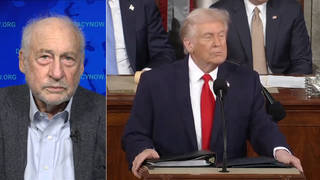
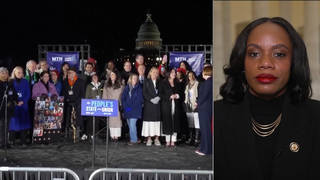
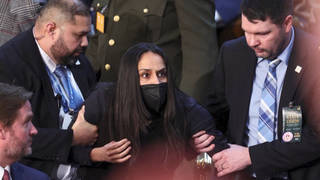





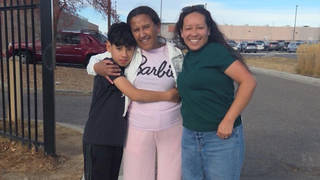
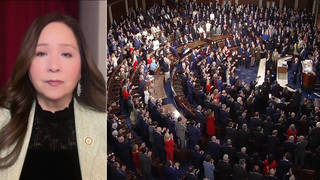
Media Options